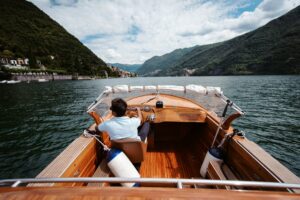In this era of hustling, laziness is scoffed at. Those who are always busy are the most venerated and those who devote themselves to the art of rest are labelled ‘unambitious’. In 2024, learning to rest and enjoy doing nothing is still an art. Throughout our existence, we have been chiselling our brains to believe that time not spent productively is time not spent well. You’d think that when the vacations come around, we would finally feel like we have earned our downtime and pull the brakes on this obsession to make the most of every minute.
But this is not always the case, Barbara Tovar, an expert psychologist in anxiety and stress with more than 20 years of experience, explains. “Many people think that disconnecting is achieved just by stopping work. However, educating our minds to stop, be in the present and let go of responsibilities is something that comes with training. When we haven’t trained our mind, it continues to cling to worries, to the search for pending tasks or to the hunt for any stimulus that allows it to continue at an accelerated pace.” Let’s imagine that we are riding a bike daily, pushing the pedals at a high speed. When we lift our feet off the pedals, they will continue to spin at the same speed for a while. So too will our minds when they are accustomed to an accelerated pace. This is what happens with “leisure sickness”.
When pleasures such as not setting the alarm clock for the next day, lying on the sandy beach or arriving at the hotel room where you will spend the next week turn into an ordeal, generating anxiety, discomfort and even physical symptoms, you know you’re in trouble. According to Tovar, this is largely caused by the demands of today’s capitalistic society. “Attention focused on performance and time optimisation is the enemy of a calm attitude. If we teach our mind to spend most of its time multitasking and anticipating situations, it becomes difficult for us to fully enjoy our free time,” says the psychologist. Tovar also notes that free time is a way for us to recharge our batteries and put our mind into “receiving” mode rather than the “giving” mode it is usually in. “If we learn to cultivate calm, protecting spaces for our mind, and balance our energy between giving and receiving, our mind will help us be in the present and enjoy our free time.”
Making the most of boredom
We live in a society that is very focused on action, productivity and efficiency. We are constantly overstimulated and unaccustomed to being with ourselves, doing nothing. But in the long run, this can be detrimental because over-stimulation never fully satisfies us. We have to learn that doing nothing is also doing something. Practise peace of mind, implement activities that you don’t do in your daily routine and generate habits that involve carving out free time throughout the year.
Another important thing to remember is to leave the technology at home. “We are creatures of habit. We tend to automate processes to save energy. When we become accustomed to constantly checking a huge list of tasks, deactivating this mode sometimes becomes difficult. Inertia leads our mind to look for something to occupy itself and maintain the same energy to which it is accustomed,” says Tovar. “If we cultivate habits that are more connected to our breathing, a relaxed attitude and a gentler rhythm with ourselves, it will be easier to take advantage of our downtime without interruptions or mental ruminations.” Curing your leisure sickness is the first step towards discarding hyper-productivity as a way of life and fatigue as a status symbol. Here’s how to deal with it better:
Understand leisure sickness
- Identify triggers: Recognise the situations or stressors that may contribute to your symptoms. This can help you address them proactively.
- Acknowledge the psychological aspect: Understand that stress and the sudden change from a busy work schedule to relaxation can be overwhelming
Preventive measures
- Gradual transition: Avoid abrupt changes in your schedule. Gradually ease into your vacation or weekend by slowly reducing your workload.
- Maintain a routine: Try to keep some aspects of your daily routine consistent, such as sleep patterns, meal times and exercise.
- Plan ahead: Ensure that you have a smooth transition into your leisure time by finishing urgent tasks beforehand and avoiding last-minute stress.
Stress management techniques
- Relaxation techniques: Practise relaxation exercises like deep breathing, meditation or yoga regularly, especially during the transition period into your leisure time.
- Physical activity: Engage in regular exercise, which can help reduce stress and improve overall well-being.
- Mindfulness: Stay present and mindful. Focus on the current moment rather than worrying about work or other stressors.
Practical tips during leisure time
- Stay engaged: Engage in activities you enjoy and find fulfilling. Boredom can sometimes exacerbate feelings of discomfort.
- Set boundaries: If work stress is a trigger, set clear boundaries to avoid work-related activities during your leisure time. Turn off you email notifications and limit your screen time.
- Avoid over-scheduling: Don’t overcommit yourself to leisure activities either. Allow for some downtime to relax and unwind.









